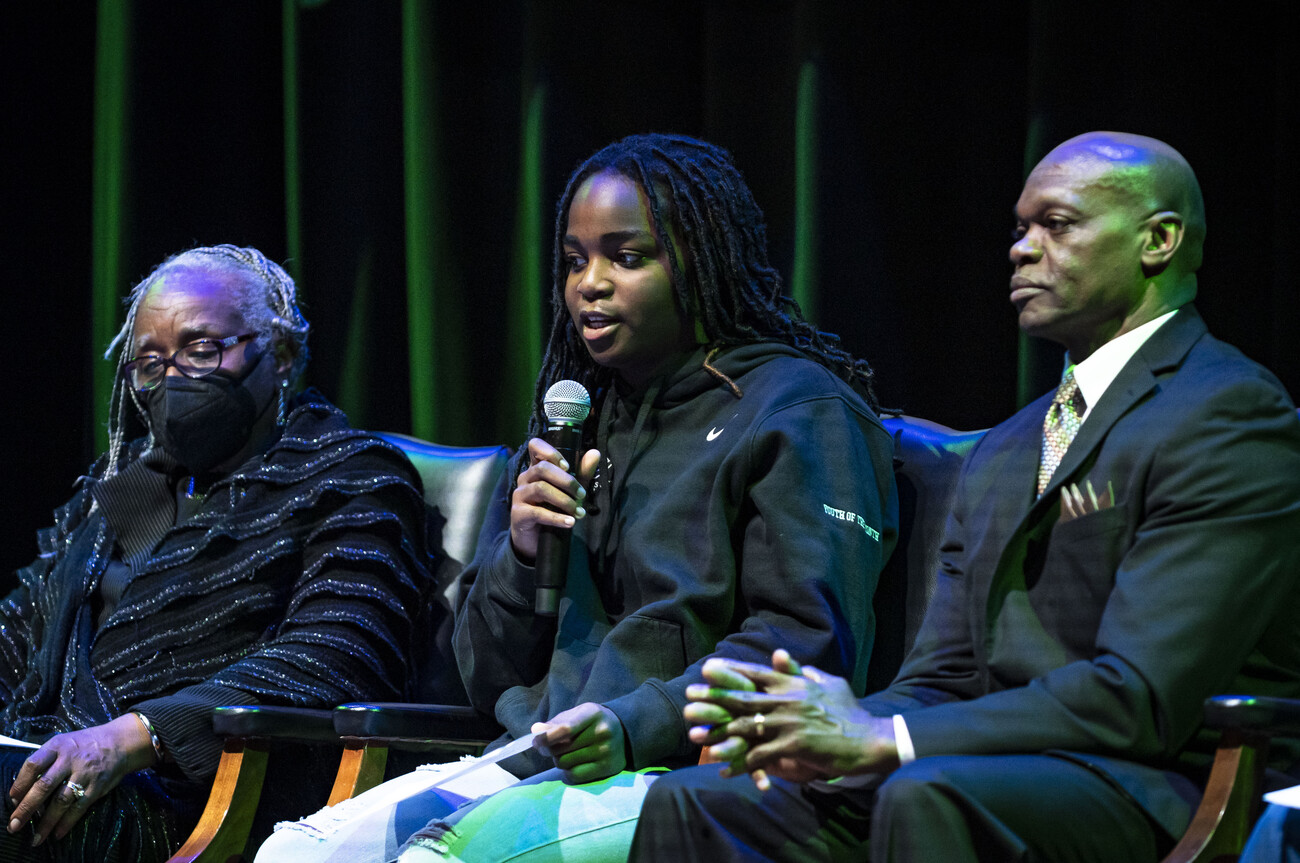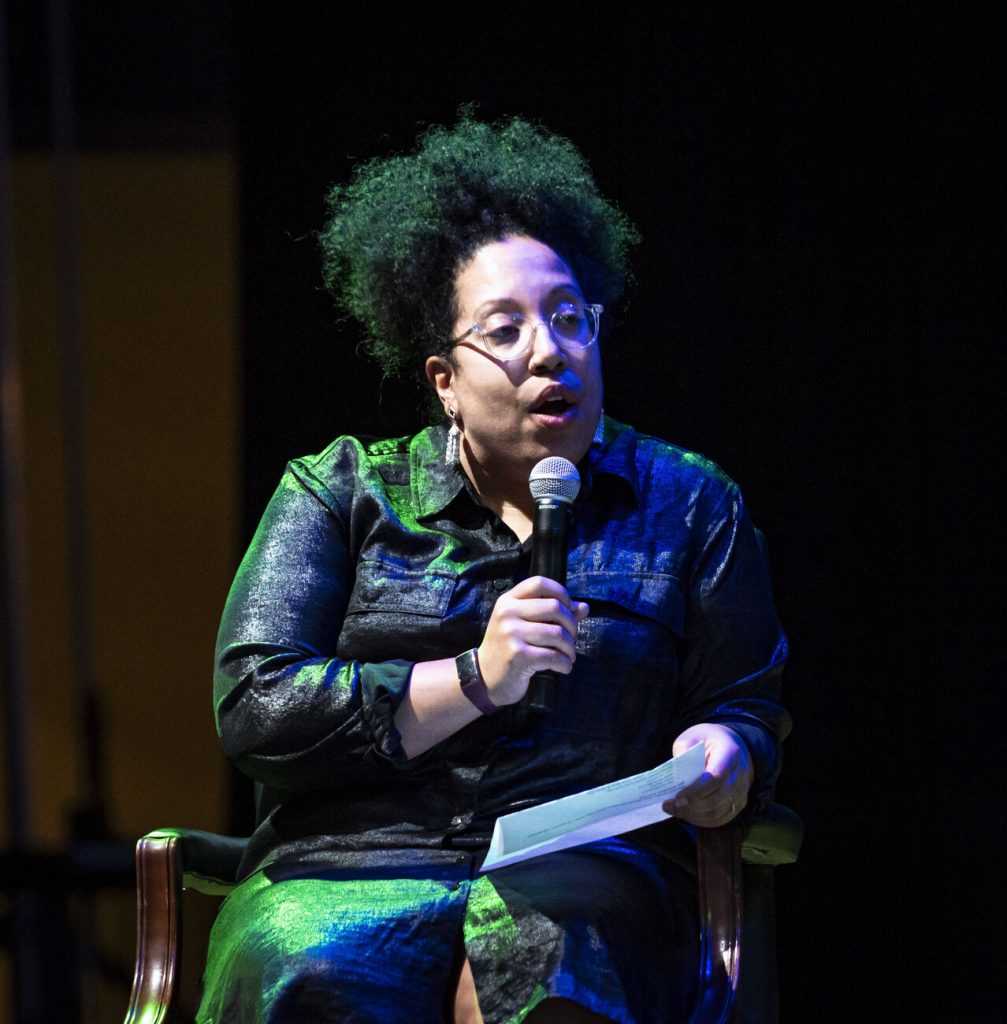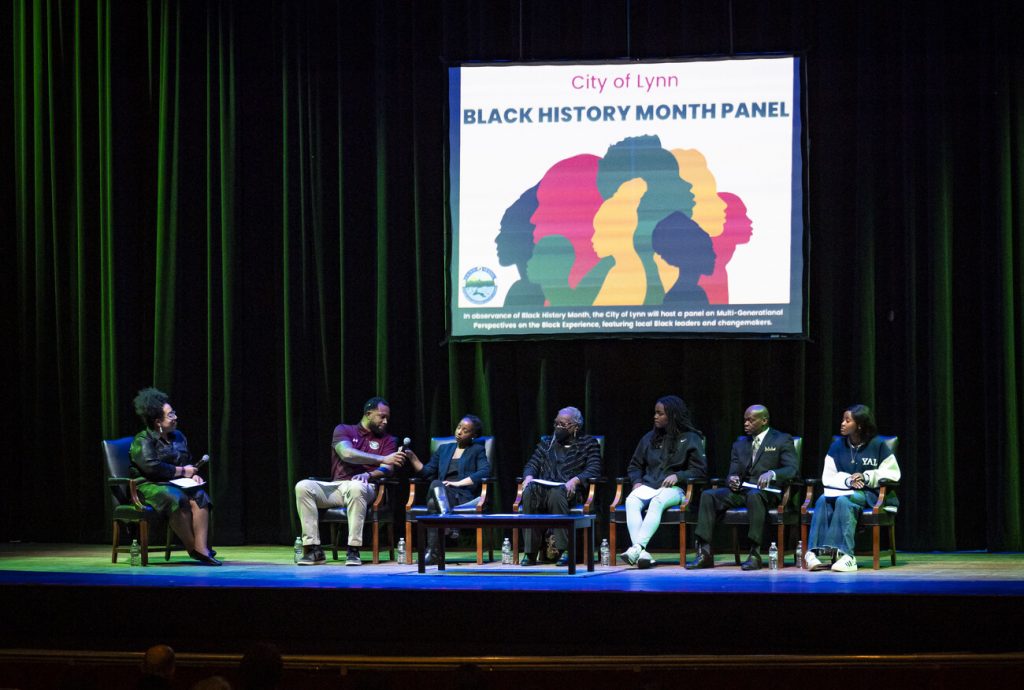

A panel of local black leaders shared their stories of what it was like growing up in Lynn and their perspectives on the black experience in honor of the Black History Month.
Lynn Museum/LynnArts Executive Director Doneeca Thurston-Chavez was the moderator for the Black History Month Panel that was held in the Lynn Auditorium on Feb. 20.
“We have an incredible black community here in Lynn and so it is wonderful to have local leaders of color here to share their experiences, share their stories with you,” Thurston-Chavez said.
The panelists highlighted the obstacles they had to overcome and their success stories. Panelists included Darrell Murkison, Mary Joyner, Antonio Anderson, Cleo Hereford, Divine Egbuta, and Zainab Lawal, who all have close connections to the city.

Joyner is involved with the Lynn Council on Aging. Hereford is a lifelong resident of Lynn and currently serves on the Lynn Citizens Advisory Board. Anderson was a star athlete in the city at Lynn Tech and a former basketball coach at Lynn English. Murkison is the executive director at the Community Minority Cultural Center. Egbuta is an active member of the Boys and Girls Club and a student at Lynn Classical. Lawal is a senior at Lynn English and a member of Girls Inc.
Thurston-Chavez opened the conversation by asking the panelists about their general experience of growing up in Lynn and how those experiences shaped them.
Murkison graduated from Lynn Classical in 1978, at the height of the Boston desegregation busing crisis.
“That atmosphere that was engulfing the city of Boston, it had a big spillover… we had a lot of racial tension in our schools in the City of Lynn as well,” Murkison said. “If you see Lynn today, so many different cultures and languages spoken, it was not always that way.”
Murkison said that those experiences made him resilient.
Lawal and Egbuta both emigrated from Nigeria.
“Here I saw many diverse cultures, and in my current life, that has really taught me to be sensitive to other people’s cultures and backgrounds,” Lawal said.
Egbuta said the city taught her to be outgoing and to break out of her shell.
“When I first came here, I didn’t think I was going to fit in,” Egbuta said. “I started to go out a lot… Lynn really showed me that people aren’t what they seem… you never know until you try it.”
Joyner’s parents moved her from Roxbury to Lynn in 1963. She said there were only five black people in her graduating class of more than 200 students in 1971 from Lynn Classical.
“I did not want to come to Lynn because I felt like there were no people of color here,” Joyner said. “What it showed me is that everyone matters. You cannot allow anyone to keep you from climbing or pursuing whatever your interest is, and you just have to push.”
Hereford said growing up in Lynn has helped her be sensitive to the people around her and made her “an active participant in the fight for social justice locally and abroad.”
Anderson said he brought the “Lynn toughness” with him, and the blue-collar identity of the city molded him as he went on to play basketball at the University of Memphis.

“I credit Lynn for all of that,” Anderson said.
The next question from Thurston-Chavez was if the panelists could change one thing about how they grew up.
Anderson said he wished there were more opportunities available. Hereford explained how a lack of resources available to students affected her transition to Wellesley College regarding internships and enrichment programs.
“We just need more places for the young people to go to… to ground them and nurture them into young men and women,” Joyner said.
Lawal said kids “turn to other options” when there isn’t much for them to do in the city.
Murkison called for an end to the violence in the city.
“Stop all this violence. We didn’t have that when we were growing up, not to that extent,” he said. “I really feel bad for the young people to have to grow up in that environment where they can’t just go to school and learn and grow and do things that young people are supposed to do.”
The last question was what made the panelists feel safe in the city.
Anderson said sports were always his outlet, and the way to stay out of trouble is to surround yourself with like-minded people. Lawal and Egbuta said the Boys and Girls Club and Girls Inc. help steer young people in the right direction.
As for Hereford, she called on community collaborations.
“Leadership is more than just a title. You can claim to be a leader, but it’s more about what you do with the power you are given with that… being collaborative and working with people, I think, is the mark of a good leader versus having that title bestowed upon you,” she said.
24World Media does not take any responsibility of the information you see on this page. The content this page contains is from independent third-party content provider. If you have any concerns regarding the content, please free to write us here: contact@24worldmedia.com

Common Mistakes When Using Athletic Field Tarps

High-Performance Diesel Truck Upgrades You Should Consider

Warehouse Optimization Tips To Improve Performance

Fire Hazards in Daily Life: The Most Common Ignition Sources

Yellowstone’s Wolves: A Debate Over Their Role in the Park’s Ecosystem

Earth Day 2024: A Look at 3 Places Adapting Quickly to Fight Climate Change

Millions of Girls in Africa Will Miss HPV Shots After Merck Production Problem

This Lava Tube in Saudi Arabia Has Been a Human Refuge for 7,000 Years

Four Wild Ways to Save the Koala (That Just Might Work)

National Academy Asks Court to Strip Sackler Name From Endowment

Ways Industrial Copper Helps Energy Production

The Ins and Out of Industrial Conveyor Belts